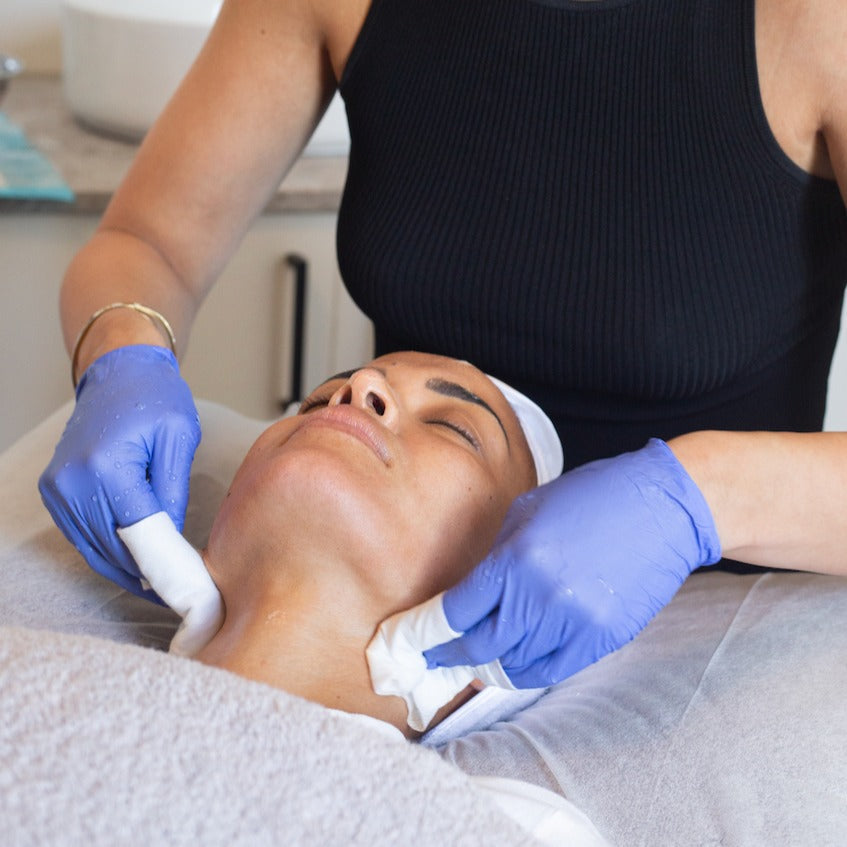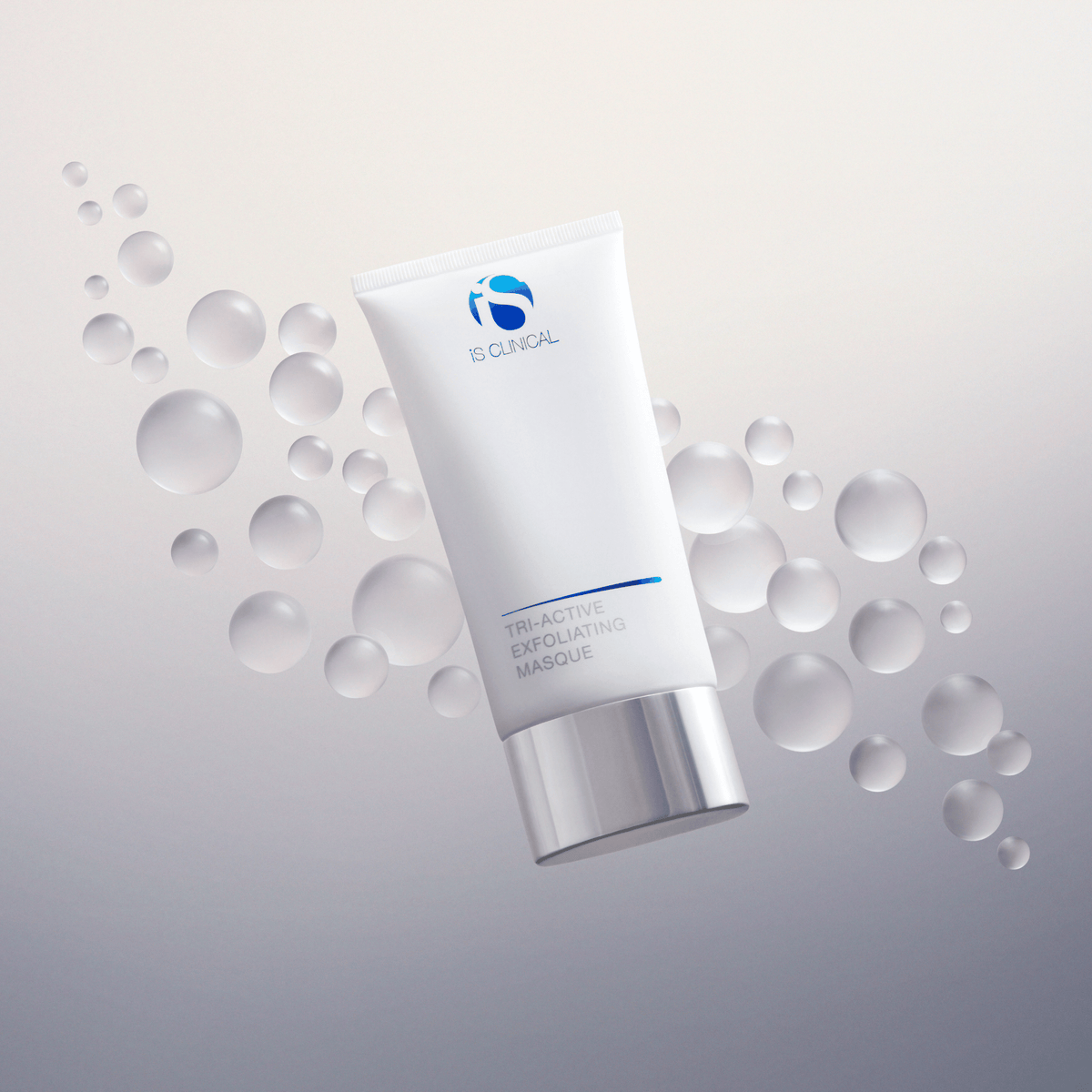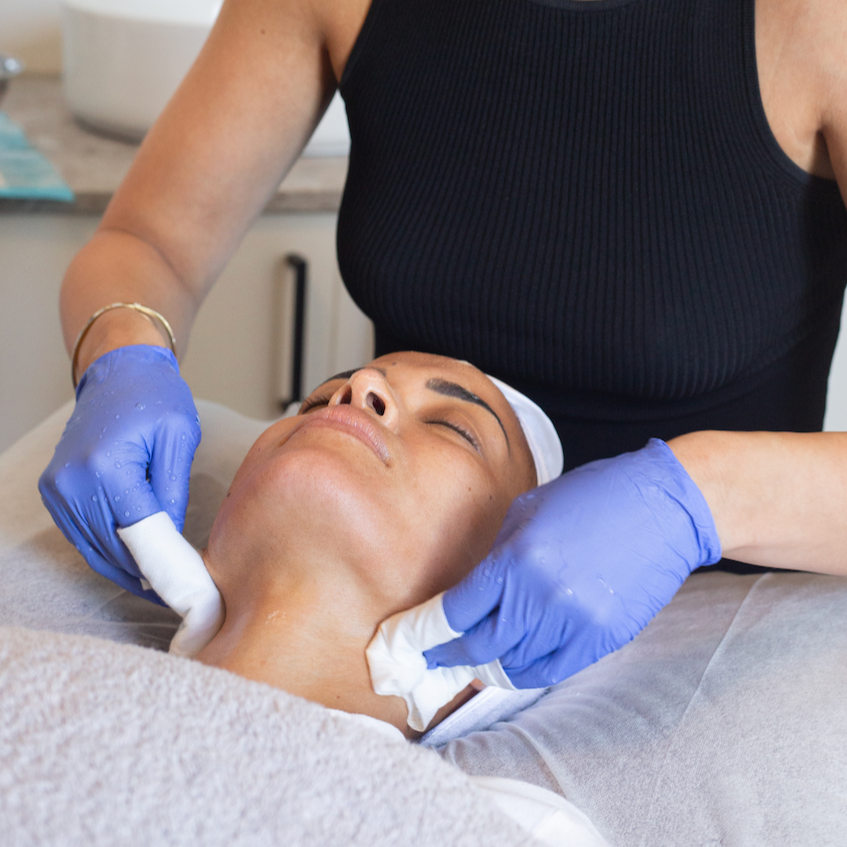8 Tested and Proven Treatments for Acne

Acne, a prevalent skin condition impacting millions globally, can be effectively treated to enhance skin appearance and elevate confidence. This blog delves into diverse acne treatments, from over-the-counter solutions to professional interventions, and offers self-help strategies for maintaining clear, healthy skin.
How Should Pimples Be Treated?
Treating pimples elegantly starts with understanding your unique skin type, acne complexity, and triggers. A tailored mix of topical treatments, lifestyle changes, and professional care can effectively manage acne. Here’s a guide to non-prescription and professional treatments.
Non-Prescription Acne Solutions
1. Salicylic Acid

IS Clinical Tri-Active Exfoliating Masque
Salicylic acid, a beta hydroxy acid (BHA), exfoliates the skin and clears clogged pores by dissolving dead skin cells and debris that cause acne. Our holistic approach offers a luxurious skincare experience, fostering community and belonging. Embrace radiant skin with our exceptional care, designed to nurture your overall wellness.
Pros:
- Effective for mild to moderate acne
- Helps reduce inflammation and redness
- Available in various formulations (cleansers, spot treatments, toners)
Cons:
- Can cause dryness and irritation if overused
Best for:
- Whiteheads and blackheads (comedonal acne), inflammation in the skin, all types of skin
2. Benzoyl Peroxide - prescribed by a GP or dermatologist
Benzoyl peroxide is a potent antibacterial agent that eliminates acne-causing bacteria and clears pores. It is especially effective against inflammatory acne, including pustules and cysts.
Pros:
- Effective against inflammatory acne
- Reduces bacteria on the skin
- Available in various strengths and forms (gels, creams, washes)
Cons:
- Can cause dryness, redness, and peeling
- May bleach fabrics and hair
- Can be too harsh for sensitive skin
Best for:
- Pustules and cystic acne (inflammatory acne)
4. Alpha Hydroxy Acids (AHAs)

ProPaira Acne Prone Skin Foaming Cleansing Gel
AHAs, including glycolic and lactic acids, are utilized to exfoliate the skin, enhance cell turnover, and refine skin texture.
Pros:
- Effective for treating surface-level acne and improving skin texture
- Helps reduce hyperpigmentation and acne scars
- Suitable for various skin types
Cons:
- Can cause irritation and increased sun sensitivity
- Requires gradual introduction to avoid over-exfoliation
- Consistent use is necessary for best results
Best for:
- Surface-level acne, hyperpigmentation, and acne scars
Professional Acne Treatment Options
5. Chemical Peels
Chemical peels involve applying a solution to the skin that causes it to exfoliate and peel away, revealing fresh, clearer skin beneath. Available in varying strengths (superficial, medium, deep), these treatments cater to different skincare needs.
Pros:
- Effective for treating various types of acne and acne scars
- Can improve skin texture and tone
- Reduces the appearance of fine lines and wrinkles
Cons:
- Can Require downtime for healing, especially for deeper peels
- Can cause redness, swelling, and peeling
- May need multiple sessions for optimal results
Best for:
- Mild to moderate acne, acne scars, and uneven skin tone
6. Laser Therapy
Browse through our premium laser treatment services
Laser therapy utilizes focused light to reduce bacteria, shrink sebaceous glands, and promote the healing of acne lesions. Common types include non-ablative, ablative, and fractional treatments, as well as non-emitting diode options.
Pros:
- Effective for severe or treatment-resistant acne
- Can improve skin texture and reduce scarring
- Reduces oil production and inflammation
- Reduces inflammation
- Improves skin tones
Cons:
- Requires multiple sessions
- Potential side effects include redness, swelling, and temporary discomfort
Best for:
- Severe acne, acne scars, and persistent inflammatory acne
7. Retinols

iS CLINICAL Retinol Emulsion 0.3
Topical retinols are vitamin A derivatives that promote cell turnover and prevent clogged pores.
Pros:
- Highly effective for moderate to severe acne
- Helps reduce the appearance of acne scars and hyperpigmentation
- Provides long-term results with continued use
Cons:
- Requires a slow introduction of the ative into the skin, in order to limit risks of side effects such as retinoic reactions.
- Requires ongoing supervision by a trusted dermal clinician.
- Can Increase skin’s sensitivity to sunlight, necessitating diligent sun protection.
Best for:
- Moderate to severe acne and acne scars
8. Oral Medications - prescribed by a GP or Dermatologist

Propaira Skin Force Plus Resveratrol & Tumeric 120 Tablets
Oral medications, such as antibiotics, birth control pills, and isotretinoin (Accutane), can be prescribed for more severe acne cases.
Pros:
- Effective for severe and cystic acne
- Can address hormonal causes of acne
- Often results in significant improvement
Cons:
- Potential side effects, varying by medication (e.g., dryness, gastrointestinal issues, hormonal changes)
- Requires strict adherence to dosage and guidelines
- Regular monitoring by a healthcare provider is necessary
Best for:
- Severe, cystic acne and acne caused by hormonal imbalances
Related: Why Adults Get Acne: Understanding the Root Causes and How to Treat Them
Exclusive Holistic Strategies to Combat and Prevent Pimples
Curate a Consistent Skincare Ritual
Embrace a consistent skincare ritual that encompasses cleansing, exfoliating, and moisturizing. Select products that align with your unique skin type and eschew harsh ingredients that may irritate your complexion.
Resist Touching Your Face
Foster the habit of keeping your hands away from your face. This simple yet impactful practice prevents the transfer of bacteria and oils, thus safeguarding your skin from potential breakouts.
Cultivate Stress Management
Stress can trigger hormonal changes that lead to acne. Practice stress-reducing techniques like meditation, exercise, and adequate sleep.
Nourish with a Balanced Diet
Indulge in a diet abundant in fruits, vegetables, lean proteins, and whole grains to enhance overall skin wellness. Mindfully limit sugary and processed foods that may aggravate acne.
Prioritize Hydration
Commit to drinking plentiful water, a simple yet vital practice that maintains skin hydration and supports the body's natural detoxification processes, potentially diminishing acne occurrences.
Acne Treatment and Medication FAQs
Is Drinking Hot Water Beneficial for Pimples?
Indulging in the simple act of drinking hot water can elevate your overall well-being, enhancing digestion and detoxifying the body. While these benefits may indirectly promote skin health, it's important to note that hot water alone isn't a cure for pimples.
Can a Hot Shower Aid in Acne Treatment?
A luxurious hot shower softens pores and aids in deep cleansing of the skin. However, excessive heat can strip away natural oils, causing dryness and irritation. For a balanced approach, opt for cooler water and avoid direct pressure from the shower hose on your face. Limiting hot shower duration maintains skin equilibrium, and emerging research suggests that finishing with a two-minute cold rinse offers remarkable benefits for both skin and body.
Need Professional Help for Acne? Consult with Skin to Heart
If you’re facing challenges with acne and seeking expert guidance, Skin to Heart offers bespoke consultations designed to help you achieve radiant, healthy skin. Our esteemed skin clinic in Malvern provides a selection of refined treatment options, meticulously tailored to clear and combat acne. Reach out to us today to arrange a personalised appointment and embark on your journey towards holistic wellness.
0 comments


